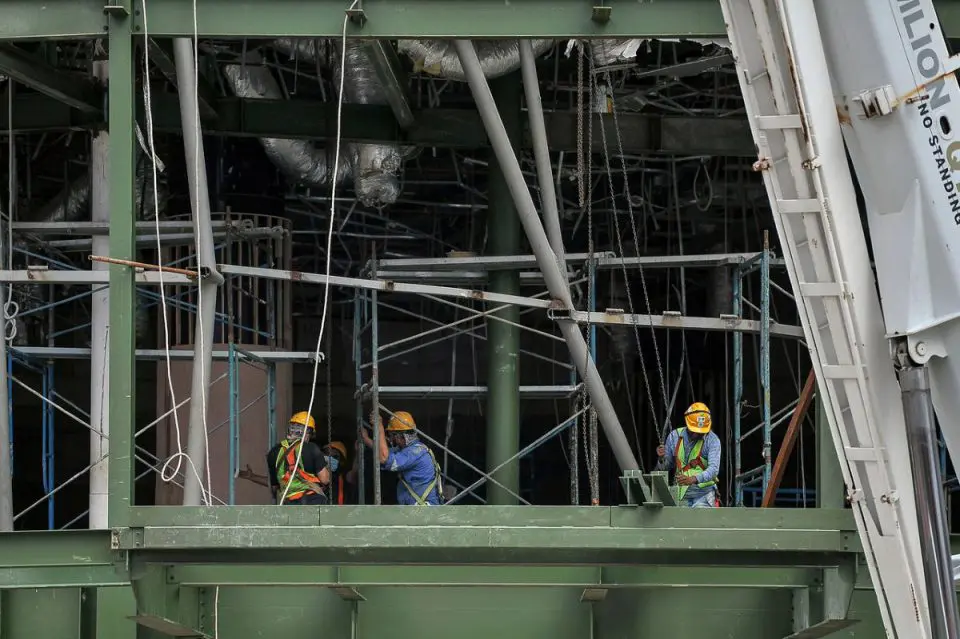KUALA LUMPUR, May 24 — Three months ago, a video that went viral on social media showed a group of high-rise building maintenance workers stuck in a gondola that was hit by strong winds and swayed violently in mid-air amid stormy weather.
Fortunately, the workers, who could be seen hanging on to the rails of the gondola, managed to climb off the platform safely.
The incident was a grim reminder of extreme weather events – brought about by global climate change – that pose a threat to at-risk workers such as those working on construction sites and in high-rise buildings.
Industrial safety experts and academics view this issue as something that warrants immediate attention because, according to the climate assessment reports issued by the Intergovernmental Panel on Climate Change, extreme weather events are expected to occur more frequently in the future.
Take weather into consideration
Commenting on this, a researcher at Universiti Tun Hussein Onn Malaysia’s Centre for Construction Sustainable Infrastructure and Environmental Management Associate Prof Dr Haryati Shafii said the time has come for employers to set standard operating procedures (SOP) that take into account the weather conditions to ensure the safety of their field workers.
“Employers have to be more sensitive to the environment their employees work in and this includes the need to provide clear guidelines (on what to do) when facing bad weather.
“One of the guidelines that need to be in place is halting all operations. This is because the risk of an accident involving heavy machinery is higher during bad weather, similar to what happened recently (in February) to the group of workers who were in the gondola that was struck by strong winds,” she said when contacted by Bernama.
She also urged employers to keep track of the current weather conditions by referring to the weather forecasts issued by the Malaysian Meteorological Department (MetMalaysia).
“This way, they can plan their maintenance or construction works in accordance with MetMalaysia’s weather forecasts, and if the weather turns bad a stop-work order should be issued immediately,” she added.
The risks are higher for those whose work involves handling heavy machinery, said Haryati, who is also a senior lecturer at the Department of Construction Management, Universiti Tun Hussein Onn Malaysia. Hence, it is important that such machinery is maintained properly and in good working condition, and only be handled by employees qualified to do so.
“Their brakes, lights, fuel levels and the engine should be checked daily to ensure they are in good condition and functioning properly. This is to avoid any technical error that can cause a mishap,” she added.
She said employers should also conduct regular briefings and safety training for the workers concerned. This will include the need to maintain efficient communication as miscommunication has been identified as one of the causes of worksite accidents.
IR4.0 technologies
Meanwhile, Malaysian Society for Occupational Safety and Health (MSOSH) president Dr Shawaludin Husin said the risk of accidents occurring at worksites due to poor weather conditions could be mitigated through the adoption of Industrial 4.0 (IR4.0) technologies.
Urging the government and industry players to expand the use of IR4.0 applications in their operations, he said employers can consider exploring the use of automation technology for jobs such as cleaning the exterior of high-rise buildings.
“And for inspection work, drones can be considered,” he said, adding that early warning systems such as meteorological sensors and thunderstorm detectors can also help to avert workplace accidents caused by natural disasters.
Dr Shawaludin said MSOSH is confident that the broader application of IR4.0 technologies can help to improve and beef up the safety and health aspect of workers, particularly those employed by the construction sector which is still mostly dependent on conventional technology.
However, he added, efforts to adapt IR4.0 technologies should not be left to the employers and industry alone, instead, the government should also support the initiative so that the mobilisation of IR4.0 technologies runs smoothly and, ultimately, meets the desired goals.
“MSOSH is prepared to collaborate with the government and industry players to accomplish this,” he said.
Early warning on weather
Universiti Kebangsaan Malaysia Faculty of Engineering and Built Environment lecturer Prof Dr Sawal Hamid Md Ali opined that even though the technology is available to warn field workers of any impending extreme weather event, many employers still remain unperturbed as they think that such a occurrences have yet to reach a critical stage.
He said an early warning system on weather changes, for example, can help workers at high-rise worksites to be prepared for any eventuality.
“Such a system can detect the wind strength and direction, and probability of rain, thus allowing any change in the weather to be known earlier. This will enable the workers to stop whatever they are doing in case there is potential for the weather to worsen,” he explained.
His views were also shared by Universiti Malaya Faculty of Engineering senior lecturer Associate Prof Dr Siti Zawiah Md Dawal who sees a need for industry players to improve their operations by adopting IR4.0 technologies.
“Besides depending on MetMalaysia’s weather forecasts, the industry should also use artificial intelligence to carry out work in high-risk areas or high-rise buildings.
“For instance, work involving the cleaning of windows in high-rise buildings can be done by making use of drones to spray on the glass panes, thus removing the need for them to be wiped manually,” she added.
— Bernama





